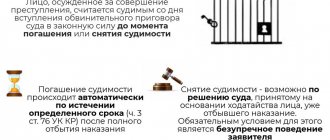The concept of a criminal record and the significance of its presence for a convicted citizen
This is the legal state of a person, which is determined by the fact of his conviction and sentencing for the crime he committed. If a person who has an outstanding or unexpunged criminal record commits a crime again, more stringent measures of criminal liability are applied to him (Resolution of the Constitutional Court of the Russian Federation dated March 19, 2003 No. 3-P).
A person is considered to have a criminal record from the day a court’s conviction for an illegal act comes into force against him. A person who has been released from punishment is considered to have no criminal record.
This status is removed from a person from the moment his criminal record is cleared or expunged.
Note!
The information remains in the Ministry of Internal Affairs database and is visible in certificates issued by law enforcement agencies.
Conditions
Removal of a conditional criminal record (that is, its early expungement) is possible under the following conditions:
- At least half of the probationary period has passed. Please note that the calculation takes into account the time of the trial, and not the duration of the assigned suspended sentence.
- The behavior of the convict is impeccable, which is confirmed by the inspector of the Criminal Investigation Department.
- The damage to the victim, if any, is fully compensated.
All conditions must be met, otherwise early removal of a criminal record is impossible. Everything must be supported by documents: certificates, characteristics, receipts, etc.
There are two more opportunities to be cleared of a criminal record early: amnesty and pardon. But the first does not depend in any way on the convicted person, and those sentenced to probation rarely resort to the second because of its specifics.
If the suspended sentence has already expired, then you do not need to take any action - the criminal record will be expunged automatically.
Ways to terminate a criminal record
Repayment differs from withdrawal in the following ways:
- repayment is made automatically. A person does not need to do anything for this, except to prevent the recurrence of crimes;
- withdrawal is made only after certain actions on the part of government agencies or the person who has served his sentence.
A criminal record can be expunged by an act of amnesty declared by the State Duma in relation to an indefinite number of persons (Article 84 of the Criminal Code of the Russian Federation) or by an act of pardon, the decision of which was made in relation to a specific person by the President of the Russian Federation.
Pardon, as a rule, does not apply to criminals who:
- were convicted of an intentional crime while on probation;
- have malicious violations in the order of serving their sentence;
- were previously released from serving a sentence on parole, under an amnesty or under an act of pardon;
- had the sanction imposed by the court replaced with a more lenient one (Decree of the President of the Russian Federation of December 28, 2001 No. 1500).
When is a conviction for theft expunged in Russia?
How long it takes for a conviction for theft to be expunged is determined by the provisions of Art. Art. 86 and 15 of the Criminal Code of the Russian Federation:
- if the offender is given a suspended sentence - at the end of the probationary period;
- if the offender is sentenced to a more lenient punishment than imprisonment - after a year has passed after serving or executing the sentence;
- if the offender is sentenced to imprisonment for theft of minor or medium gravity, i.e. according to Parts 1 and 2 of Art. 158 of the Criminal Code of the Russian Federation, - at the end of the three-year period after serving the sentence;
- if the offender is sentenced to imprisonment for serious theft, i.e. according to Parts 3 and 4 Art. 158 of the Criminal Code of the Russian Federation, - at the end of the eight-year period after serving the sentence.
Note!
In situations where a person is released from a sanction early, or the unserved part of the sentence is replaced with a more lenient form, the repayment period is calculated based on the period actually served.
How does the procedure for terminating a criminal record go through the court?
In some cases, a criminal record can be expunged early, before the expiration date established by the Criminal Code of the Russian Federation. The procedure is carried out in court. In this case, it is necessary that the following conditions are met to allow the judge to make a positive decision on the petition:
- a previously convicted person must provide evidence of his impeccable behavior after serving his sentence;
- The party affected by the theft must be fully compensated for the damage.
The procedure for early withdrawal is regulated by Art. 400 Code of Criminal Procedure of the Russian Federation. The person who has served his sentence for theft has the right to bring before the court the issue of premature removal of this status. To do this, it is necessary to correctly draw up the appropriate petition. To avoid mistakes, it is advisable to involve an experienced lawyer in drafting the document. Failure to comply with all the rules or incorrect presentation of information may result in the court refusing to expunge your criminal record early. It will be possible to apply to the court again with a request to consider the issue only after a year. A petition is sent according to jurisdiction, based on the place of residence of the previously convicted person.
Note!
A person who asks the court for early withdrawal must be present at the court hearing to consider his petition.
The court will first of all listen to the explanations of the citizen himself, then the evidence presented by him will be studied. Later, the arguments of the prosecutor, as well as third parties invited to the meeting, whose opinions are also important for the court, will be heard.
If a positive decision is made on the petition for early expungement of a criminal record, a corresponding decision will be made. You can make sure that it has really been removed by contacting the information center of the Ministry of Internal Affairs of the Russian Federation at your residence address with your passport. At this center you should order the appropriate certificate, which is provided free of charge. It is also possible to order a document through the government services website and in some MFCs. Within a month, a document indicating information about the presence (or absence) of a criminal record will be prepared and handed over to the applicant.
Other ways to expunge a criminal record
There are no other methods other than those indicated in this article. Therefore, there is no point in hoping for an amnesty (no one can say for sure how long it will take to wait for the next one) or for a presidential pardon.
You should apply for early expungement of your criminal record to the court. To draw up the correct petition and find out what supporting documents you need to collect in your situation, contact our lawyers. You can contact us through the website or by calling the indicated phone numbers. The cost of specialist services will depend on the complexity of the case.
How long does it take to expunge a criminal record?
Hello, I was sentenced in 2008 to 2.5 years, was released on parole, was given 1 year and 2 months, when I got a job, the security service checked me and found out everything. Isn't a criminal record expunged after 6 years? Article 228 part 2 of the Criminal Code of the Russian Federation
Lawyer Antonov A.P.
Good afternoon according to Part 2 of Article 228 of the Criminal Code, illegal acquisition, storage, transportation, production, processing without the purpose of sale of narcotic drugs, psychotropic substances or their analogues in a significant amount, as well as illegal acquisition, storage, transportation without the purpose of sale of plants containing narcotic drugs drugs or psychotropic substances, or their parts containing narcotic drugs or psychotropic substances, committed on a large scale - shall be punishable by imprisonment for a term of three to ten years with a fine in the amount of up to five hundred thousand rubles or in the amount of the wages or other income of the person convicted of a period of up to three years or without it and with restriction of freedom for a period of up to one year or without it. According to Article 79 of the Criminal Code, a person serving detention in a disciplinary military unit, forced labor or imprisonment is subject to parole if the court recognizes that for his correction he does not need to fully serve the sentence imposed by the court, and also compensated harm (in whole or in part) caused by a crime, in the amount determined by a court decision. In this case, the person may be fully or partially released from serving an additional type of punishment. When applying conditional early release, the court may impose on the convicted person the duties provided for in part five of Article 73 of this Code, which must be fulfilled by him during the remaining unserved part of the sentence. Conditional early release can be applied only after the convicted person has actually served: a) at least one third of the sentence imposed for a crime of minor or medium gravity; b) at least half of the sentence imposed for a serious crime; c) at least two-thirds of the term of punishment imposed for a particularly serious crime, as well as two-thirds of the term of punishment assigned to a person previously released on parole, if parole was canceled on the grounds provided for in part seven of this article; d) at least three quarters of the sentence imposed for crimes against the sexual integrity of minors, as well as for grave and especially grave crimes related to the illicit trafficking of narcotic drugs, psychotropic substances and their precursors, as well as for crimes provided for in Articles 205, 205.1, 205.2, 205.3, 205.4, 205.5, 210 and 361 of this Code; e) at least four-fifths of the sentence imposed for crimes against the sexual integrity of minors under fourteen years of age. The term of imprisonment actually served by the convicted person cannot be less than six months. When considering a convicted person’s request for conditional early release from serving a sentence, the court takes into account the behavior of the convicted person, his attitude to study and work during the entire period of serving the sentence, including available incentives and penalties, the attitude of the convicted person to the committed act and the fact that the convicted person is partially or fully compensated for the damage caused or otherwise made amends for the harm caused as a result of the crime, as well as the conclusion of the administration of the correctional institution on the advisability of his parole. In relation to a convicted person suffering from a disorder of sexual preference (pedophilia), which does not exclude sanity, and who, at the age of over eighteen years, has committed a crime against the sexual integrity of a minor under fourteen years of age, the court also takes into account the application of compulsory medical measures to the convicted person, his attitude towards treatment and results of forensic psychiatric examination. A person serving a life imprisonment may be released on parole if the court finds that he does not need to further serve this sentence and has actually served at least twenty-five years of imprisonment. Conditional early release from further serving of life imprisonment is applied only if the convicted person has not committed malicious violations of the established procedure for serving the sentence during the previous three years. A person who commits a new grave or especially grave crime while serving a life imprisonment is not subject to parole. Control over the behavior of a person released on parole is carried out by an authorized specialized state body, and in relation to military personnel - by the command of military units and institutions. If, during the remaining unserved part of the sentence: a) the convicted person committed a violation of public order, for which an administrative penalty was imposed on him, or maliciously evaded the fulfillment of the duties assigned to him by the court when applying parole, as well as forced sentences imposed by the court measures of a medical nature, the court, upon the proposal of the authorities specified in part six of this article, may decide to cancel parole and execute the remaining unserved part of the sentence; b) the convicted person has committed a crime through negligence or an intentional crime of minor or medium gravity, the issue of canceling or maintaining parole is decided by the court; c) the convicted person has committed a serious or especially serious crime, the court imposes punishment on him according to the rules provided for in Article 70 of this Code. According to the same rules, punishment is imposed in the case of a crime committed through negligence or an intentional crime of minor or medium gravity, if the court revokes parole. According to Article 15 of the Criminal Code, depending on the nature and degree of public danger, the acts provided for by this Code are divided into crimes of minor gravity, crimes of medium gravity, serious crimes and especially serious crimes. Crimes of minor gravity are recognized as intentional and careless acts, for the commission of which the maximum punishment provided for by this Code does not exceed three years of imprisonment. Crimes of average gravity are recognized as intentional acts, for the commission of which the maximum penalty provided for by this Code does not exceed five years of imprisonment, and careless acts, for the commission of which the maximum penalty provided for by this Code exceeds three years of imprisonment. Serious crimes are intentional acts for which the maximum punishment provided for by this Code does not exceed ten years of imprisonment. Particularly serious crimes are intentional acts, the commission of which is punishable by this Code in the form of imprisonment for a term of over ten years or a more severe punishment. Taking into account the actual circumstances of the crime and the degree of its public danger, the court has the right, in the presence of mitigating circumstances and in the absence of aggravating circumstances, to change the category of the crime to a less serious one, but not more than one category of crime, provided that for committing the crime specified in part three of this article, the convicted person is sentenced to a sentence not exceeding three years of imprisonment, or another more lenient punishment; for committing a crime specified in part four of this article, the convicted person is sentenced to a punishment not exceeding five years of imprisonment, or another more lenient punishment; for committing a crime specified in part five of this article, the convicted person is sentenced to a punishment not exceeding seven years of imprisonment. According to Article 86 of the Criminal Code, a person convicted of committing a crime is considered to have a criminal record from the day the court’s conviction enters into legal force until the criminal record is expunged or removed. A criminal record in accordance with this Code is taken into account in case of recidivism of crimes, imposition of punishment and entails other legal consequences in cases and in the manner established by federal laws. A person released from punishment is considered to have no criminal record. A criminal record is expunged: a) in relation to persons on probation - upon expiration of the probationary period; b) in relation to persons sentenced to more lenient punishments than imprisonment - after one year after serving or executing the sentence; c) in relation to persons sentenced to imprisonment for crimes of minor or medium gravity - after three years after serving the sentence; d) in relation to persons sentenced to imprisonment for serious crimes - after eight years after serving the sentence; e) in relation to persons convicted of especially serious crimes - after ten years after serving the sentence. If the convicted person, in accordance with the procedure established by law, was released early from serving the sentence or the unserved part of the sentence was replaced by a more lenient punishment, then the period for expunging the criminal record is calculated based on the actually served term of the sentence from the moment of release from serving the main and additional types of punishment. If the convicted person behaved impeccably after serving his sentence and also compensated for the damage caused by the crime, then, at his request, the court may remove his criminal record before the expiration of the criminal record. Expungement or removal of a criminal record cancels all legal consequences provided for by this Code associated with a criminal record. Thus, in your case, given that the act provided for in Part 2 of Article 228 of the Criminal Code is a serious crime, the period of criminal record is 8 years and begins to be calculated from the moment you are released on parole from serving your sentence. That is, the criminal record has now been expunged. However, the Ministry of Internal Affairs database stores information that you have been convicted.
Sincerely, lawyer Anatoly Antonov, managing partner of the law firm Antonov and Partners.
Still have questions for your lawyer? Ask them right now here, or call us by phone in Moscow +7 (499) 288-34-32 or in Samara +7 (846) 212-99-71 (24 hours a day), or come to our office for a consultation (by pre-registration)!
Removal of a criminal record based on an act of pardon or amnesty
The legal act of amnesty is adopted by the State Duma of the Russian Federation . The main purpose of the amnesty is the partial or complete release of a certain category of persons from serving or executing a sentence, as well as the premature expungement of criminal records from convicted citizens who have fulfilled the penalty established by the court. In addition, severe punishment can be replaced by an act of amnesty with a more lenient one.
The act does not cover specific people, but a certain category of persons . Persons included in the amnesty are notified in writing of the expungement of their criminal record. The time frame within which a convicted person can be granted amnesty is not specified by law.
Pardon, unlike amnesty, is an individual act of the head of state. The purpose of a pardon is to mitigate or release convicted persons from the remainder of their sentence, as well as to early expunge a particular person’s criminal record.
A convicted person can ask for pardon at any time after the court verdict comes into force.
So, there are 3 ways to clear a criminal record: judicial procedure, pardon and amnesty. Removal and expungement of a criminal record are not similar procedures, and they are carried out on different grounds.
Cancellation of a criminal record is possible only after the end of the period established by law and if the convicted person meets certain requirements.
Main conclusions
- An individual can remove or expunge a criminal record. The withdrawal procedure is carried out by submitting a special petition, and repayment occurs by default.
- How long it takes for a criminal record to be annulled depends on the type and severity of the crime committed by an individual.
- In order to get rid of the stigma of a convicted person ahead of schedule, one must have impeccable behavior, complete obedience to executive authorities, as well as the desire to become a law-abiding citizen.
- There are several ways to find out whether a criminal record has been expunged. This can be done online using the government services portal. This information can also be obtained from one of the police departments.
Concept of criminal record
The rules governing this issue are outlined in Art. 86 of the Criminal Code of the Russian Federation, in Art. 400 of the Code of Criminal Procedure of the Russian Federation, as well as in a number of other acts.
A criminal record is a legal condition caused by a conviction for committing an act characterized by restriction of the rights and freedoms of the perpetrator within the period established by law and the court.
Art. 86 of the Criminal Code contains some aspects regarding criminal records, namely:
- After serving the sentence, supervision or preventive surveillance is established over the convicted person during the period of his criminal record.
- Committing a criminal act during a criminal record aggravates responsibility, increases the severity of punishment, is taken into account when qualifying crimes and excludes the possibility of applying a number of types of exemption from criminal liability.
When is a criminal record expunged in Russia?
Information about how long it takes for a criminal record to be expunged is presented in the current Criminal Code (Article 86). The repayment period depends on the severity of the crime committed.
A criminal record is automatically expunged after:
- 1 year - for persons who were sentenced without imprisonment;
- 3 years - for persons sentenced to imprisonment for a term of up to 3 years;
- 8 years - in case of imprisonment of a convicted person for a term of up to 10 years (for intentional serious crimes);
- 10 years – if a person is convicted for a term exceeding 10 years, as well as with more severe penalties;
- probation period if a suspended sentence was applied.
The calculation of the term begins from the final date of departure or completion of the sentence imposed by the convicted person.
Procedure
Of course, you can try to remove the mark. To do this, it is better to enlist legal assistance in order to correctly draw up a claim and win the case. It’s easiest when the information was entered illegally into the database. This situation will be taken into account, and the court will make a decision in favor of the plaintiff. Because human rights will be violated, and the mark will harm his life. After all, a certificate of criminal prosecution spoils a citizen’s reputation.
In general, a person will be required to go to court and state the essence of the problem. You must also attach existing documents related to the case. After that, all that remains is to wait for the hearing and a decision. If the decision is positive, then all that remains is to wait until the unwanted information is deleted.
It has already been said about how long criminal cases against people are kept. However, 25 years later, the information itself is not removed from the Ministry of Internal Affairs database. They will remain there throughout the citizen’s life, unless a different court decision can be achieved.







